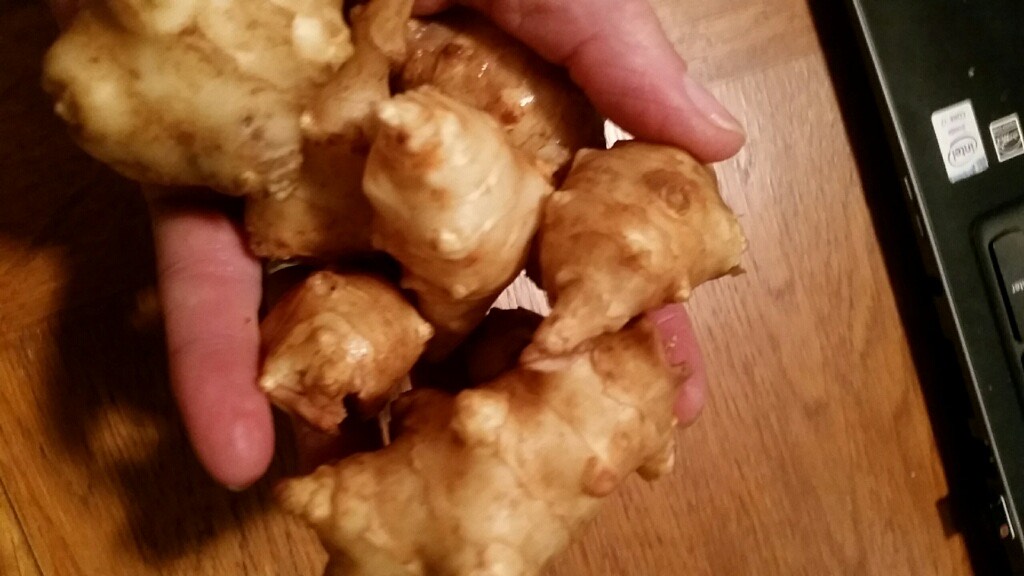Jerusalem Artichokes
go.ncsu.edu/readext?774481
en Español / em Português
El inglés es el idioma de control de esta página. En la medida en que haya algún conflicto entre la traducción al inglés y la traducción, el inglés prevalece.
Al hacer clic en el enlace de traducción se activa un servicio de traducción gratuito para convertir la página al español. Al igual que con cualquier traducción por Internet, la conversión no es sensible al contexto y puede que no traduzca el texto en su significado original. NC State Extension no garantiza la exactitud del texto traducido. Por favor, tenga en cuenta que algunas aplicaciones y/o servicios pueden no funcionar como se espera cuando se traducen.
Português
Inglês é o idioma de controle desta página. Na medida que haja algum conflito entre o texto original em Inglês e a tradução, o Inglês prevalece.
Ao clicar no link de tradução, um serviço gratuito de tradução será ativado para converter a página para o Português. Como em qualquer tradução pela internet, a conversão não é sensivel ao contexto e pode não ocorrer a tradução para o significado orginal. O serviço de Extensão da Carolina do Norte (NC State Extension) não garante a exatidão do texto traduzido. Por favor, observe que algumas funções ou serviços podem não funcionar como esperado após a tradução.
English
English is the controlling language of this page. To the extent there is any conflict between the English text and the translation, English controls.
Clicking on the translation link activates a free translation service to convert the page to Spanish. As with any Internet translation, the conversion is not context-sensitive and may not translate the text to its original meaning. NC State Extension does not guarantee the accuracy of the translated text. Please note that some applications and/or services may not function as expected when translated.
Collapse ▲By Pat Weisbrodt
Master Gardener℠ volunteer (and Master Beekeeper!) in Chatham County
Helianthus tuberosus has many common names, but Jerusalem artichoke and sunchoke seem to be used most often. It is a perennial sunflower that is native to North America. The plant is very easy to grow but can be a problem if you have limited space. It will spread at the rate of twenty or more tubers for every tuber planted. It tolerates most soils as long as the ground doesn’t stay saturated. The height is six to nine feet with the leaves lance-shaped, coarse, and hairy. It blooms mid to late fall. Harvesting should start after the first frost in fall/winter and ends in the spring. Also, it is best to dig when you need them. They will store in the refrigerator if placed in a plastic bag with a few slightly damp paper towels. Over time, they will change in color but will last up to two months.
The tubers are planted 4 to 6 inches deep and 12 to 18 inches apart the first two weeks in March. Pick a spot that has full sun. It will be 120 days to maturity. Planting is similar to planting Irish potatoes because you can cut larger ones in pieces but making sure there are 2 to 3 buds on each section. They are best grown in zones 3 to 9. The tubers are knobby and the skin can be different colors and is thin, smooth, and edible. The flesh is pure white, for most varieties, unless exposed to air too long. There are over 200 varieties and skin colors will vary with each.
So how does this knobby tuber taste? Raw it is crispy like a water chestnut. You can slice or shred and add to salads or left in chunks to make pickled Jerusalem artichokes. Cooked, use them like potatoes. They are very good boiled, roasted, baked, or fried. It gives stews and soups a bit of a nutty and sweet flavor. If you Google this vegetable, you will be amazed at the number of recipes you will want to try.
Be careful not to overcook – the ‘chokes will become mushy! And, another very important point: eat in moderation, as they contain inulin, which can cause flatulence, especially if it is more than half of your meal. Or as one English writer wrote, “It may cause wind”. The ‘chokes can be boiled in lemon juice and the bad effects go away while retaining the flavor. For the nerds out there, the technical term is “acid hydrolysis”. Bon Appetit!
For more information, visit: Growing Jerusalem Artichokes






